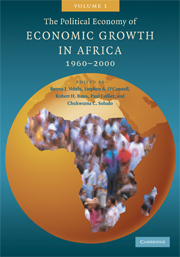Book contents
- Frontmatter
- Contents
- List of figures
- List of tables
- List of contributors
- Foreword
- List of acronyms
- PART 1 OVERVIEW
- PART 2 INTERPRETATION
- 4 Domestic interests and control regimes
- 5 Sacrificing the future: intertemporal strategies and their implications for growth
- 6 The political geography of redistribution
- 7 Political conflict and state failure
- 8 Shocks, risk, and African growth
- PART 3 EXPLANATION
- PART 4 LOOKING AHEAD
- Index
- References
7 - Political conflict and state failure
Published online by Cambridge University Press: 09 January 2010
- Frontmatter
- Contents
- List of figures
- List of tables
- List of contributors
- Foreword
- List of acronyms
- PART 1 OVERVIEW
- PART 2 INTERPRETATION
- 4 Domestic interests and control regimes
- 5 Sacrificing the future: intertemporal strategies and their implications for growth
- 6 The political geography of redistribution
- 7 Political conflict and state failure
- 8 Shocks, risk, and African growth
- PART 3 EXPLANATION
- PART 4 LOOKING AHEAD
- Index
- References
Summary
Introduction
In his chapter on Ethiopia in volume 2, Alemayehu Geda contends that in addition to the “vagaries of nature,” growth performance in Ethiopia “is largely determined by [the] strength and efficiency of institutions, [the] efficacy of public policies, and risk related to war” (Alemayehu 2007: 2). Of these factors, Alemayehu emphasizes the last, placing special emphasis on internal war. Internal conflict also emerges as a major determinant of economic performance in the chapters in volume 2 on Chad (Azam and Djimtoingar 2007), Sudan (Ali and Elbadawi 2007), Sierra Leone (Davies 2007), Burundi (Nkurunziza and Ngaruko 2007), Mozambique (de Sousa and Sulemane 2007), Kenya (Mwega and Ndung'u 2007), and Uganda (Kasekende and Atingi-Ego 2007), or in nearly one-third of the country studies.
In Chad and Sudan, provinces in the North have sought to dominate those in the South, and in both countries’ natural resources – specifically oil – represent a major prize. In Sierra Leone, diamonds rather than petroleum constitute the spoils of war, and rival political machines – each as adept at campaigning in the field of battle as in the electoral arena – seek to capture power and thus control over diamond revenues. In Burundi, a fraction of the ruling elite used their position in the military to slaughter their opponents, capture the state, and employ public power to secure private privilege. In Kenya, incumbents mobilized private militias to clear key districts of opposition voters as they reacted to the threat posed by the re-introduction of electoral competition.
- Type
- Chapter
- Information
- The Political Economy of Economic Growth in Africa, 1960–2000 , pp. 249 - 296Publisher: Cambridge University PressPrint publication year: 2007
References
- 5
- Cited by



